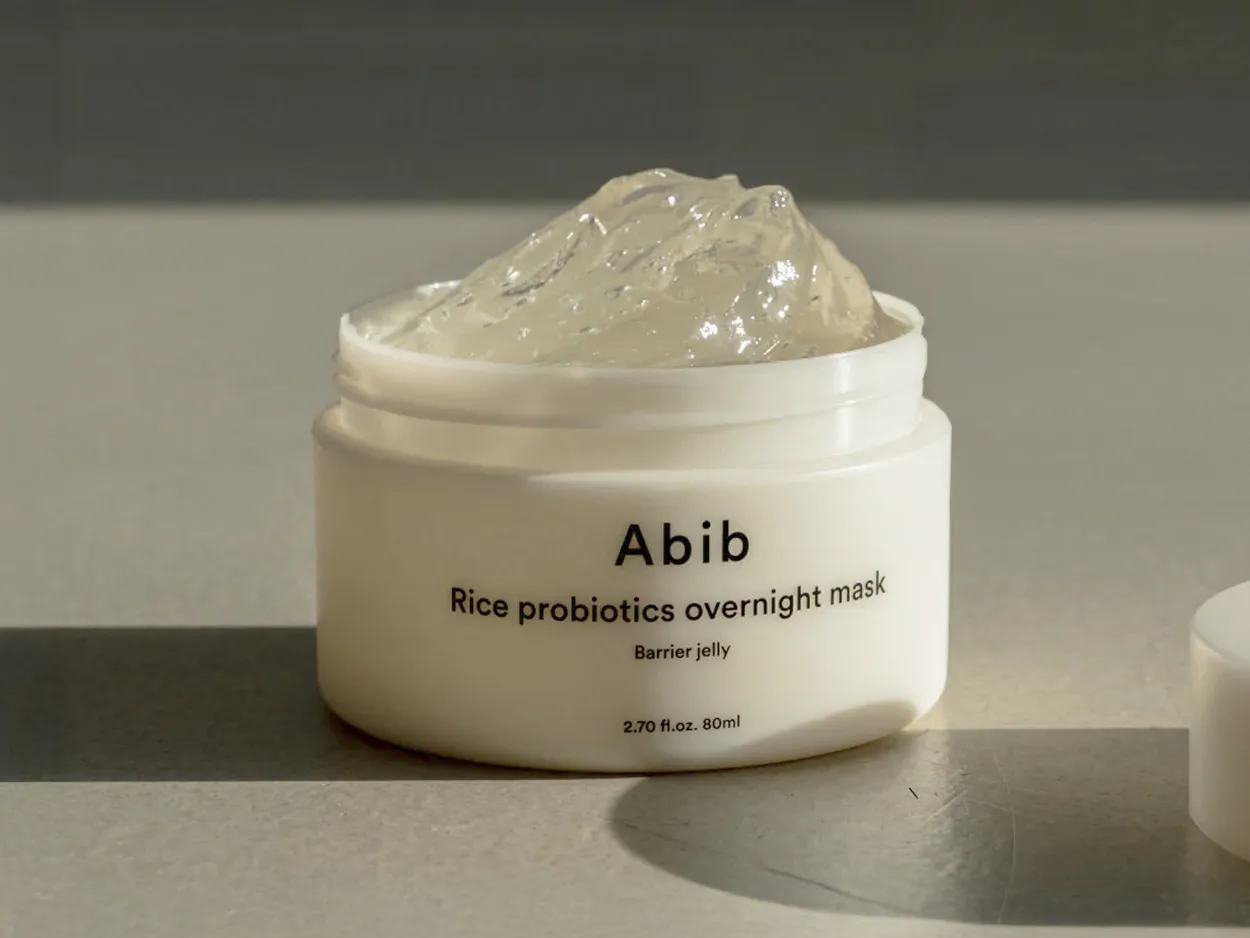Abib might not be splashed across every billboard yet, but among skincare insiders its minimalist formulas and skin science savvy earn genuine respect. The Korean brand is known for favoring quality actives over flashy gimmicks and it usually walks that talk.
Enter the Rice Probiotics Overnight Mask, a name that sounds half spa treatment half health food aisle. According to Abib it is designed to let you wake up to plumper glowing skin, shore up the barrier with lactobacillus probiotics and drench the face in a bouncy jelly veil that feels lighter than it looks. The company promises a balanced complexion and gentle nightly nourishment that suits every skin type.
I spent a solid two weeks putting that pitch to the test, applying the mask each night to gauge hydration levels, texture changes and overall radiance. Here is what I found and whether it is worth your skin budget.
What is Rice Probiotics Overnight Mask?
This product sits in the overnight treatment category, a group of leave-on formulas designed to work while you sleep. Unlike a rinse-off mask or a daytime moisturizer, an overnight treatment is meant to be the last step after serums and creams, creating a thin seal that lets actives sink in steadily over several hours. The goal is to wake up with skin that looks more rested than it did the night before.
Abib’s version focuses on two things: hydration and barrier support. A jelly-like matrix holds humectants such as glycerin, diglycerin and sodium hyaluronate, ingredients that pull water into the upper layers of skin. Alongside those, the mask includes rice ferments and lactobacillus probiotics. These are intended to reinforce the skin’s microbiome and buffer it against everyday environmental stressors. Adenosine and allantoin round out the formula with soothing and smoothing benefits.
The texture is intentionally lightweight so it can layer over existing skincare without feeling heavy, yet still provide enough occlusion to prevent overnight water loss. It is marketed as suitable for all skin types, including sensitive complexions that may want barrier help without aggressive actives.
Did it work?
In the name of science I benched my usual overnight treatment for three full days before starting the Rice Probiotics mask, which felt very lab-coat of me even if the only beakers in sight were my coffee mugs. Fourteen nights seemed like a fair window to see what this jelly could really do, so I applied it as the final step after a mid-weight serum and a basic moisturizer.
Night one brought that cool, bouncy slip the brand promises. A nickel-sized scoop spread easily, set to a slightly tacky finish in under a minute and stayed put without pill-up on my pillow. By morning my skin felt pleasantly cushioned and fine lines around my mouth looked a touch softer, though the effect faded once I washed my face.
Through the first week the biggest change was a steady drop in the roughness I usually get on the sides of my nose. Glycerin and sodium hyaluronate clearly pulled their weight and the mask sealed everything in without the heavy feel some occlusive products leave behind. Still, my combination T-zone woke up a bit oilier than normal, something blotting paper fixed but worth noting if you skew shiny.
Days eight to twelve were the plateau. The initial boost in smoothness held, redness around my cheeks calmed a notch and no new breakouts appeared, which I attribute to the probiotic ferment and the absence of fragrance. On the flip side I did spot two tiny closed comedones along my jaw that I rarely see, suggesting the lightweight film can still trap oil if you are prone to congestion.
By day fourteen I could say my barrier felt comfortable, dehydration lines stayed muted and my skin tone looked a hair more even, yet the promised “radiant jump-out-of-bed glow” never truly materialized. Hydration and gentleness, yes. Transformative plumpness, not so much.
So did it work? Partly. It delivers reliable overnight moisture and keeps irritation at bay but it stops short of game-changer status for me. I will finish the jar for no-fuss hydration when my skin feels fragile, though I will likely return to my usual powerhouse sleep mask rather than make room for this one long term. If you want calm, lightweight hydration it is a pleasant option and I am happy it exists even if it does not earn permanent residency on my shelf.
Rice Probiotics Overnight Mask’s main ingredients explained
The formula opens with water followed by a trio of classic humectants: dipropylene glycol, glycerin and diglycerin. These small molecules behave like moisture magnets, drawing ambient water into the upper layers of skin so you wake up feeling less parched. Sodium hyaluronate appears a bit further down the list and adds that familiar, sponge-like hydration boost without the weight of heavier occlusives.
Next comes the star complex, a blend of lactobacillus/rice ferment, saccharomyces/rice bran ferment and plain rice bran extract. Together they deliver amino acids, B-vitamins and mild antioxidants while encouraging a balanced microbiome. The probiotic ferment is also what makes the mask suitable for sensitive users who want barrier support without aggressive actives. Because all ferments here are derived from grains, the product appears friendly for both vegans and vegetarians, though strict ethical shoppers may still want brand confirmation on manufacturing practices.
On the texture side, glyceryl polymethacrylate plus two acrylic copolymers create the “bouncy jelly” network that keeps the mask lightweight yet stay-put. Ammonium acryloyldimethyltaurate/VP copolymer does most of the gelling while acrylates/C10-30 alkyl acrylate crosspolymer adds a soft occlusive film that reduces overnight water loss. These polymers are silicone-free and generally non-comedogenic, but any film former can trap existing oil so acne-prone users should ensure skin is well cleansed first. Rice bran extract carries a very low comedogenic rating of 2 on the standard 0-5 scale, meaning it is unlikely to clog pores for most yet could be a minor risk for those extremely susceptible. (Comedogenic simply means an ingredient has the potential to block pores and trigger breakouts.)
Soothing cameos round things out: allantoin calms redness and speeds micro-healing while adenosine supports smoother texture over time. Preservation duties fall to 1,2-hexanediol and ethylhexylglycerin which double as light moisturizers. Tromethamine buffers pH to a skin-friendly range and disodium EDTA keeps metal ions from destabilizing the lot. There is no added fragrance, drying alcohol or essential oil which lowers irritation potential. The absence of retinoids, hydroxy acids and high-dose niacinamide makes the formula generally pregnancy friendly, however anyone expecting or nursing should still clear new topicals with their physician.
What I liked/didn’t like
Here is the quick rundown after two weeks of nightly use.
What works well:
- Delivers a clear boost in overnight hydration leaving skin comfortably cushioned by morning
- Lightweight jelly texture spreads easily and layers over serums without pilling or feeling heavy
- Fragrance free formula with rice ferments and allantoin stays friendly to sensitive or easily irritated skin
What to consider:
- Can leave combination or oily areas looking shinier than usual come morning
- Glow payoff is modest so results may feel underwhelming if you expect a dramatic radiance jump
- The occlusive film may encourage tiny closed comedones for those prone to congestion when skin is not thoroughly cleansed
My final thoughts
Fourteen nights in, I am comfortable giving Abib’s Rice Probiotics Overnight Mask a solid 7/10. It excels at quiet barrier support and steady hydration, two boxes many complexions need ticked, yet it does not quite deliver the next-morning luminosity its marketing hints at. Compared with heavier sleepers I have used, it sits light and never stings, which makes it an easy recommendation for normal, dry or sensitive types craving a gentle moisture cushion. If your skin leans oily or you chase dramatic glass-skin glow, you may find the finish a touch dewy and the payoff underwhelming. I would still pass it on to a friend whose main goal is calm, hydrated skin but I would set expectations realistically.
Over years of testing night treatments I have built a small personal hall of fame, so a quick word on proven alternatives. Nocturnal Revive Cream by Deascal is my current all-rounder: balanced occlusion, a mix of peptides and ceramides and a friendlier price per millilitre. For skin that craves a restorative but oil-free hug, Squalane + Ectoin Overnight Rescue by BIOSSANCE layers like a light cloud yet leaves me plump by sunrise. When travel or air-conditioning has my complexion looking parched, LANEIGE Water Sleeping Mask reliably pulls me back from the brink without heaviness. And on nights I want barrier love plus a measured hit of antioxidants, Advanced Night Restore by Medik8 stays in rotation thanks to its ceramide blend and subtle but noticeable smoothing.
Regardless of which formula you choose, remember the basics: introduce only one new product at a time, and please patch test first (apologies for sounding like an over-protective parent). Overnight masks are maintenance, not miracles, so any improvement you see will fade if you stop using them consistently. Treat them as part of a well-rounded evening routine and they will pull their weight while you sleep.

